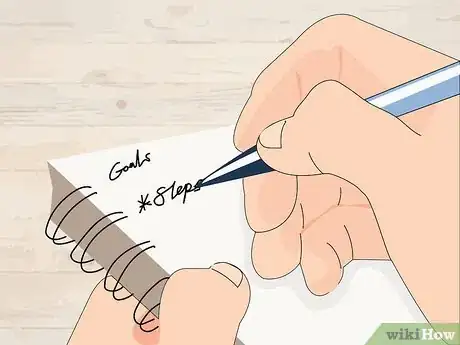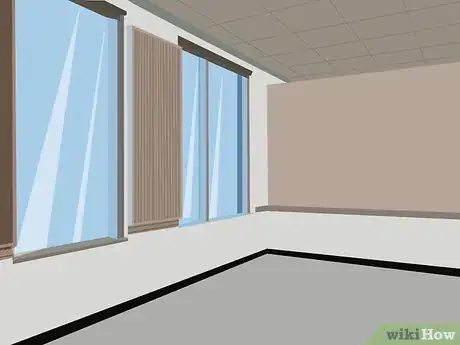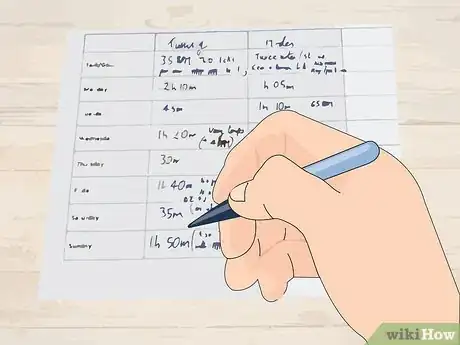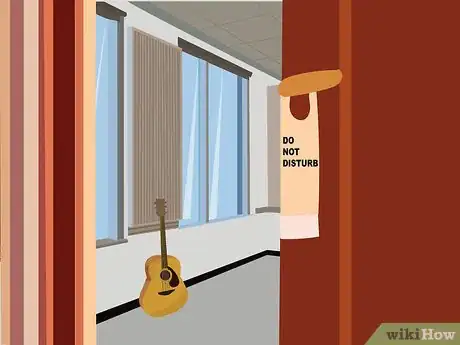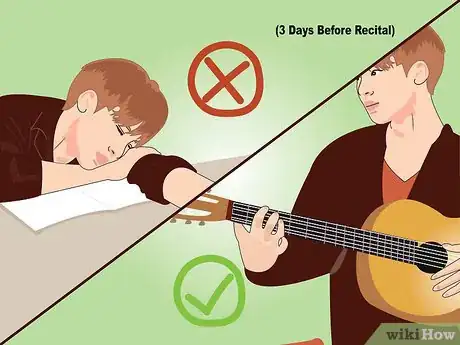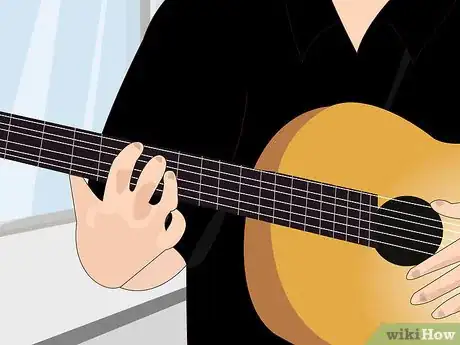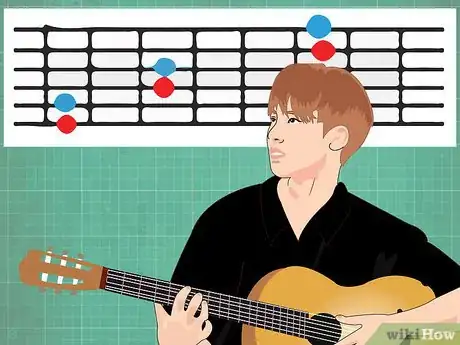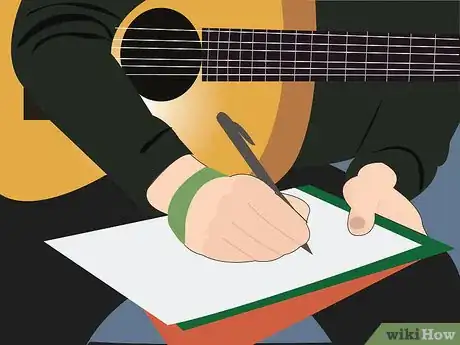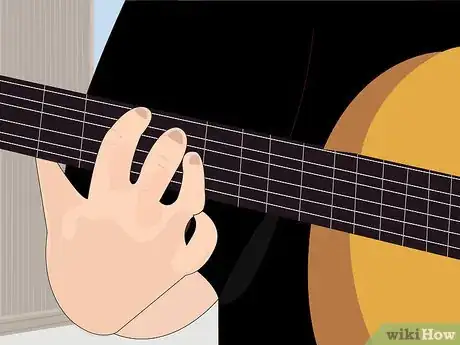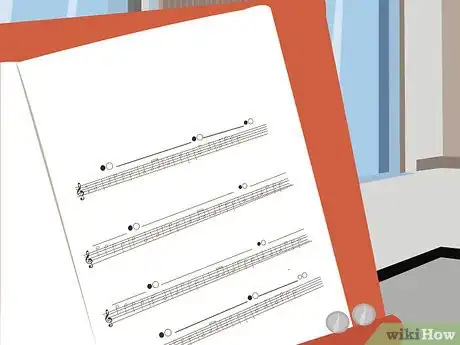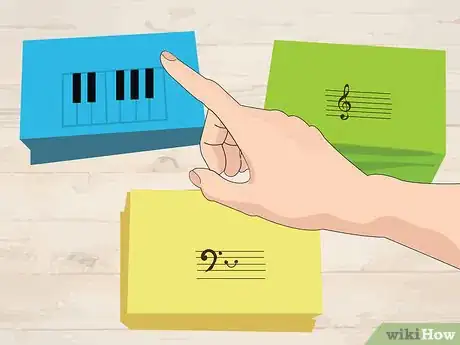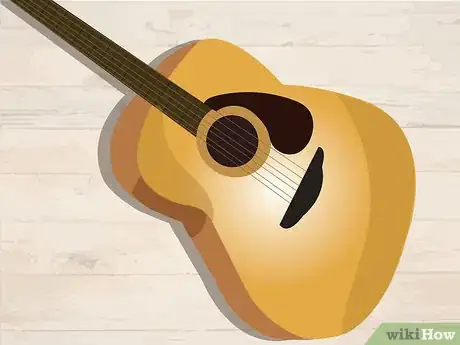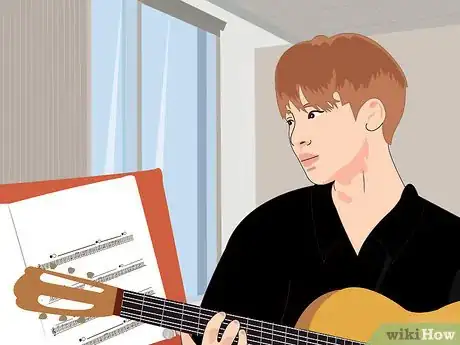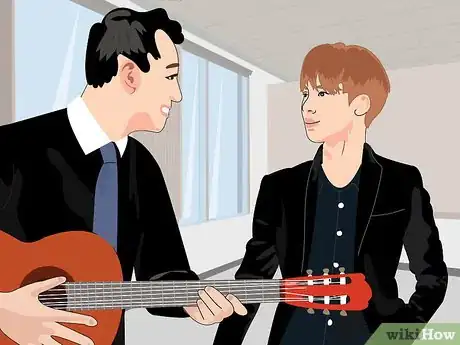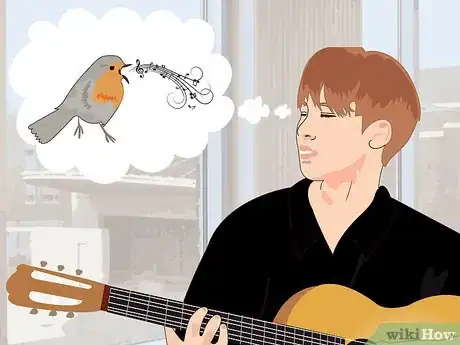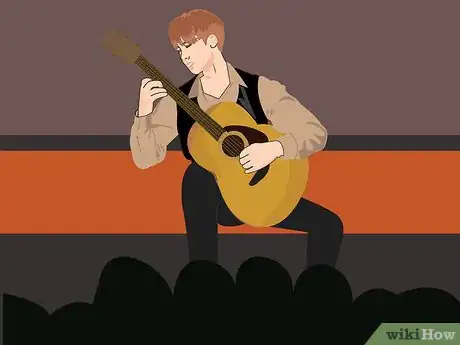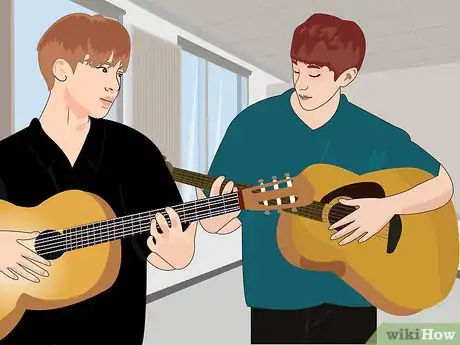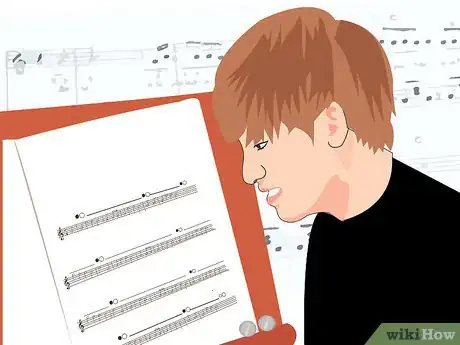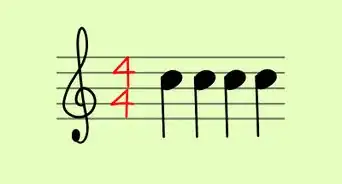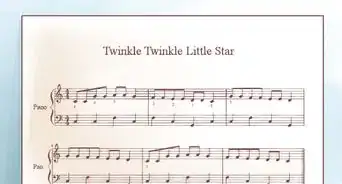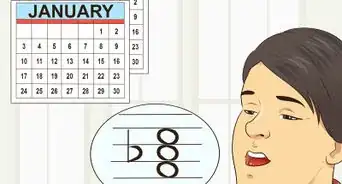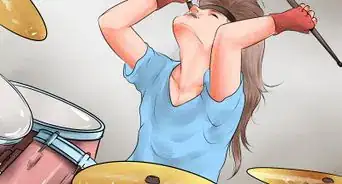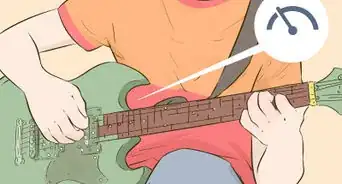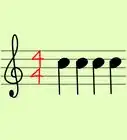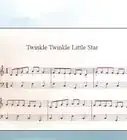This article was co-authored by Carlos Alonzo Rivera, MA. Carlos Alonzo Rivera is a guitarist, composer, and educator based in San Francisco, California. He holds a Bachelor of Arts degree in Music from California State University, Chico, as well as a Master of Music degree in Classical Guitar Performance from the San Francisco Conservatory of Music. Carlos specializes in the following genres: classical, jazz. rock, metal and blues.
There are 21 references cited in this article, which can be found at the bottom of the page.
This article has been viewed 46,205 times.
In order to play an instrument well, you will need to practice. However, sometimes practicing an instrument can feel like a chore. Changing your practice routine and finding inspiration can make learning an instrument more fun. Everyone is different, so find out what which motivational techniques work best for you!
Steps
Preparing to Practice
-
1Set goals. Set yourself a goal for each practice session. Write down what you want to accomplish with the practice session beforehand. Keep notes on your progress in a practice log.[1] Dedicate your practice session to achieving your goal rather than adhering to a specific amount of practice time.[2]
- For example, instead of following a rule of practicing for 30 minutes, focus on achieving your musical goal for the day, whether it takes 12 minutes or 40 minutes.
- An example of a goal you might set would be: “This practice session I will memorize four lines of this sheet music.”
- When you accomplish goals, reward yourself. Your brain reacts to reward systems with a “habit loop” – meaning when you receive a reward for a task, your brain is inclined to repeat the successful behavior.[3]
-
2Change your practice location. If your instrument is moveable, change the physical location where you practice. For example, if you usually practice your instrument in the dining room, try practicing in the bedroom instead – perhaps with a window view. Weather permitting, you may even be able to practice outside! Just remember to tune your instrument whenever you change rooms.[4]
- If your instrument is not easily moveable, such as a piano, you may consider getting a portable version of your instrument (such as a keyboard) so that you can vary your practice location from time to time.
- Move any practice accessories with you to the new location, or have duplicates of them. For instance, bring with you a music stand, a pencil, a pencil sharpener, a clean eraser, and any instrument-specific supplies such as guitar picks or reeds. Always have your supplies on-hand, wherever you practice.[5]
Advertisement -
3Change your practice schedule. Individuals are psychologically wired to practice different amounts and in different ways. If you've been abiding by a rigid practice schedule, try abandoning it – at least temporarily. Sometimes teachers or parents encourage you to box yourself into a practice timetable that makes you feel restricted rather than inspired. Prove to yourself and others that your creative energy is enough to lead you by ditching your set practicing times and playing when you feel the impulse instead.[6]
- Schedule days that are “practice-free zones,” when you are not obligated to practice unless you feel the urge to do so.
- If you don't have a practice schedule, you should implement one. Dedicate a certain time of the day to practicing your instrument.[7]
-
4Create a barrier between your practice and the outside world. When you need to practice, plan a “force field” of sorts as a way of shutting out distractions. It could be a sign, a t-shirt, or a note stuck to your door. Let everyone else know that you're not to be disturbed while you're practicing.[8] Have a designated, quiet practice area ready when you need it.[9]
- Ask others to leave you alone when you practice, at least for a couple of weeks. Try saying, "I want to find out whether I have more motivation and better results alone or with an audience. Would you mind making sure I'm undisturbed during practice for the next two weeks, to see how it goes?"
- If your parents, family or roommates don't interrupt and are silent when you're practice, it may be fine for them to be in the room.
-
5Don't wait until the last minute to practice. Think of each upcoming lesson and event as a deadline you must prepare for ahead of time.[10] For instance, if you know that you have a concert in 10 days, and you practice 27 hours beforehand (an average of 3 hours per day), you could impress your teacher or friends and maybe even move up chairs in orchestra.[11]
- Lessons are meant for learning and working on new material. The more you prepare beforehand, the more you will be able to address new concepts during your lessons.
Changing Your Practice Style
-
1Change your timing. Play at different speeds: slow, medium and fast. Use a metronome and practice scales with different beat durations or tempos. Instead of playing through the beat continuously, try a stop-and-go method.[12]
- For instance, play three notes, pause, play three more notes, pause again, and continue this variation.
-
2Use different practice techniques. Instead of just playing the same piece repeatedly in the same way, try new ways of playing it.[13] Change octaves. Practice with your eyes closed sometimes. Alternate playing softly and loudly. Try practicing while you bounce, dance, wiggle your head, or beatbox.[14]
- Explore other practice methods, such as chaining. With chaining, you play small units at tempo and slowly build longer chains of units. Start with a small passage and add a measure each time you master a small unit.[15]
-
3Isolate trouble spots. Play a piece completely through the first time and mark down the places where you ran into difficulty. Take those portions out and practice them separately. Isolating and repeating difficult music passages can help you to master a piece of music.
- Instead of getting discouraged when you reach parts that cause you stumble, you extract them and give them hyper-focus until you can play them as well as the rest of the piece.
-
4Break practice sessions into blocks. Each day of practicing should at least include a block of playing scales as well as a block of time focused on building technical skills.[16] Repeat one activity (or "block") acceptably before moving on to the next. This encourages comfort with the activity and prompts muscle memory to kick in.[17]
- For example, spend the first block of time warming up, the second block on a difficult piece of music, the third on proper finger placement, and the fourth on some smaller pieces you have already practiced before.[18]
- Another approach is to time each block. For example, spend 10 minutes on scales. Even if you don't get it perfect by the end of that time, move on to the next block. Otherwise, getting stuck can be frustrating.
-
5Use visible benchmarks to master difficult measures. A good way to do this is to place three objects, such as coins or beads, in front of you (on your music stand, if possible). When you play a challenging measure correctly, move one object to the right. If you play the measure through successfully again, move another object to the right. If you stumble with the notes or rhythm, return all of the objects to the left. You have to play the measure through without errors three times in a row in order to move all of the objects to the right-hand side.[19]
- Once all of your coins or beads are to the right, you can connect the difficult measure to the measures surrounding it, and then to the rest of the music.
-
6Make practice into a game. Make flashcards with musical tasks in four groups: warmups, technical methods, difficult or long songs, and easy or short songs. You can list specific songs, scales or chords on the flashcards, or write in general terms such as genres or octaves. Alternate your practice session with “surprise” flash card days. Choose one flashcard at random from each group to determine which musical pieces you will practice that day.
- Roll dice: whatever number you get is how many times you will play a measure or a song.[20]
- Try incorporating your practice into a board game. Keep a board game designated for instrument practice in your music area. Each time you master a piece of music or a technique, move up a space on the game board and write down what you achieved.
Finding Inspiration
-
1Identify with your instrument. One of the most important factors in staying motivated to practice music is the enjoyment and satisfaction you gain from playing your instrument. Students who fail to identify with their instrument are less likely to stick to their craft. Remind yourself of the reasons you liked your instrument in the first place.
- Think about the unique beauty of your instrument and the design that went into making it. Handle it gently and examine its texture, curves and details. Look at your instrument as if it has its own personality, and consider the great potential it has to assist you in elevating your skills.[21]
-
2Go to concerts and other musical events. Attending concerts or musicals as an audience member can be inspiring. Participating in these events yourself as a musician can be motivating factors to continue practicing an instrument. Watching musical movies also has the potential to boost your creativity.
- Use the inspiration from musical events to practice with performance in mind. Think about how skilled musicians played their instruments during performances and channel their examples as you play your own instrument – even when you're just rehearsing.[22]
-
3Select practice pieces that you like. If you have musical instructors, ask them to allow you to select parts of your practice. Students may learn faster if allowed to choose some of their own music or practice routines. When you practice at home, try playing current music or other pieces that you enjoy.[23]
- There are various online sources where you can find free sheet music to practice with.
- Focus on practicing pieces in a style you like—the more time you spend playing, the better you'll be![24]
-
4Get inspiration from others. Ask people whose advice you trust – such as your music teacher or parents – who they consider to be musical greats. Also ask them which pieces by those artists they found to be the most moving. Write down the names of the musicians and specific pieces of music. Then go to an online music source such as YouTube, iTunes or Spotify and listen to some of the songs. Watching performances by musical geniuses can spark your enthusiasm for playing your instrument![25]
- If the person you're asking also plays an instrument or has in the past, ask if he or she knows of any tips for making practice fun.
-
5Get creative. Make up songs. Make up words to instrumental melodies that don't have vocals. Think outside the box: trying to mimic a bird's song or the refrain of a ballad on your instrument can be a fun way to practice playing by ear.[26]
- If there is a portion of music you're struggling with, try improvising the piece by changing chords or notes until you get a better feel for the piece.[27]
-
6Have a recital. Invite any peers who also practice instruments to participate. Host a recital for supportive family members and/or friends who love music. They will get a free, personal concert, and you will have an extra incentive to practice! Pick a piece that you love and will enjoy practicing repeatedly.[28]
- Whether or not you want to schedule a live recital, view every lesson you take as a mini-recital.[29]
-
7Take breaks. Distracting yourself can actually boost your creativity. When you are feeling frustrated, take a break and do something that requires more muscle memory than thought, so that your mind can wander. When your brain shifts modes in such a way, you can experience a “creative pause” – new solutions, ideas, and motivation can unexpectedly pop up.[30]
- For example, try taking a shower, doing the dishes, mowing the lawn or folding laundry. Allow your mind to wander and try not to focus on thinking directly about any obstacles you are facing in music practice.
-
8Play with someone else. Playing music with others can result in social, creative improvisation. You can join in and pick up the rhythm, sound, or tunes of others. Don't save playing your instrument alongside your peers for lessons or recitals; try practicing and rehearsing with other musicians, whether their instruments are the same as yours or different mediums.[31] There is also software such as Jamulus which allows you to collaborate with other musicians in online jam sessions.
- If you don't have a peer who can practice an instrument alongside you, try asking someone to sing while you play.
-
9Challenge yourself. Try playing harder songs. You must take on new challenges in order to develop new skills. However, the challenge should be matched to your skill level.[32]
- The music you are working to excel at should not make you bored – if it does, it's below your skill level.
- The music should be complex to you, but not so difficult that it makes you anxious. If you find yourself getting discouraged, take it back a notch and practice something not quite so hard.
Expert Q&A
-
QuestionHow can I enjoy playing guitar?
 Nicolas AdamsNicolas Adams is a 5th generation musician of Serbian Gypsy descent and the lead guitarist of the band Gypsy Tribe. Based in the San Francisco Bay Area, Nicolas specializes in Rumba Flamenco and Gypsy jazz and playing the guitar, Bouzouki, Balalaika, and piano.
Nicolas AdamsNicolas Adams is a 5th generation musician of Serbian Gypsy descent and the lead guitarist of the band Gypsy Tribe. Based in the San Francisco Bay Area, Nicolas specializes in Rumba Flamenco and Gypsy jazz and playing the guitar, Bouzouki, Balalaika, and piano.
Professional Guitarist Try to avoid going into practice with negative thoughts like "I don't want to do this" or "This is too hard." If you can stay positive and not overthink things, you'll have an easier time staying motivated.
Try to avoid going into practice with negative thoughts like "I don't want to do this" or "This is too hard." If you can stay positive and not overthink things, you'll have an easier time staying motivated. -
QuestionI am very sick today and I have a cold. My nose has been running a lot and I also have been coughing a lot and resting. Should I practice my instrument when I am sick? I play the piano.
 Community AnswerIf coughing and sneezing disturbs you and makes you less concentrated, don't play, but if you are fine with it go ahead. If you are not wanting to get out of bed and stand up after a rest, better off not playing.
Community AnswerIf coughing and sneezing disturbs you and makes you less concentrated, don't play, but if you are fine with it go ahead. If you are not wanting to get out of bed and stand up after a rest, better off not playing. -
QuestionHow can I get my parents to stop motivating me to practice my instrument when I have told them several times that I have been practicing a lot?
 Community AnswerDo you feel stressed by their efforts to motivate you? If so, let them know how you're feeling. If you want to prove to them that you have improved, you could show them a song that you have been practicing.
Community AnswerDo you feel stressed by their efforts to motivate you? If so, let them know how you're feeling. If you want to prove to them that you have improved, you could show them a song that you have been practicing.
References
- ↑ http://www.npr.org/sections/deceptivecadence/2012/06/18/155282684/getting-kids-to-practice-music-without-tears-or-tantrums/
- ↑ http://www.pbs.org/parents/education/music-arts/how-to-motivate-your-child-to-practice/
- ↑ http://www.npr.org/2012/03/05/147192599/habits-how-they-form-and-how-to-break-them
- ↑ http://insidemusicteaching.com/when-students-wont-practice/
- ↑ http://www.npr.org/sections/deceptivecadence/2013/09/03/216906386/10-easy-ways-to-optimize-your-music-practice
- ↑ http://insidemusicteaching.com/when-students-wont-practice/
- ↑ https://www.creativemusicadventures.com/content/practice-time-or-lesson-time
- ↑ http://insidemusicteaching.com/when-students-wont-practice/
- ↑ http://www.npr.org/sections/deceptivecadence/2013/09/03/216906386/10-easy-ways-to-optimize-your-music-practice
- ↑ https://www.creativemusicadventures.com/content/practice-time-or-lesson-time
- ↑ http://www.bulletproofmusician.com/how-many-hours-a-day-should-you-practice/
- ↑ http://makingmusicmag.com/5-fun-ways-to-practice-scales/
- ↑ http://insidemusicteaching.com/when-students-wont-practice/
- ↑ http://hallmusicproductions.com/how-to-make-practice-fun/
- ↑ http://www.classicalguitar.org/2010/04/practice-techniques-chaining/
- ↑ http://www.pbs.org/parents/education/music-arts/how-to-motivate-your-child-to-practice/
- ↑ http://www.bulletproofmusician.com/why-the-progress-in-the-practice-room-seems-to-disappear-overnight/
- ↑ http://www.npr.org/sections/deceptivecadence/2012/06/18/155282684/getting-kids-to-practice-music-without-tears-or-tantrums/
- ↑ http://www.npr.org/sections/deceptivecadence/2012/06/18/155282684/getting-kids-to-practice-music-without-tears-or-tantrums
- ↑ https://www.hoffmanacademy.com/blog/how-to-make-piano-practice-fun/
- ↑ http://www.artoffreedom.me/move-your-audience-by-loving-your-instrument/
- ↑ https://books.google.com/books?id=ItXVE2rr3p4C&pg=PA6&lpg=PA6#v=onepage&q&f=false
- ↑ Nicolas Adams. Professional Guitarist. Expert Interview. 17 September 2019.
- ↑ Carlos Alonzo Rivera, MA. Professional Guitarist. Expert Interview. 24 June 2021.
- ↑ http://hallmusicproductions.com/how-to-make-practice-fun/
- ↑ http://hallmusicproductions.com/how-to-make-practice-fun/
- ↑ https://books.google.com/books?id=4R3i1EKHweYC&lpg=PP1&dq=isbn%3A0415972817&pg=PA33#v=onepage&q&f=false
- ↑ http://hallmusicproductions.com/how-to-make-practice-fun/
- ↑ https://www.creativemusicadventures.com/content/practice-time-or-lesson-time
- ↑ http://www.bulletproofmusician.com/how-to-reduce-practice-room-angst-and-boost-creativity/#
- ↑ https://books.google.com/books?id=WFY3DAAAQBAJ&pg=PA82
- ↑ https://books.google.com/books?id=ffJ0XNXyDXQC&pg=PT50#v=onepage&q&f=false
- ↑ https://www.hoffmanacademy.com/blog/how-to-make-piano-practice-fun/
- ↑ http://www.npr.org/sections/deceptivecadence/2013/09/03/216906386/10-easy-ways-to-optimize-your-music-practice
